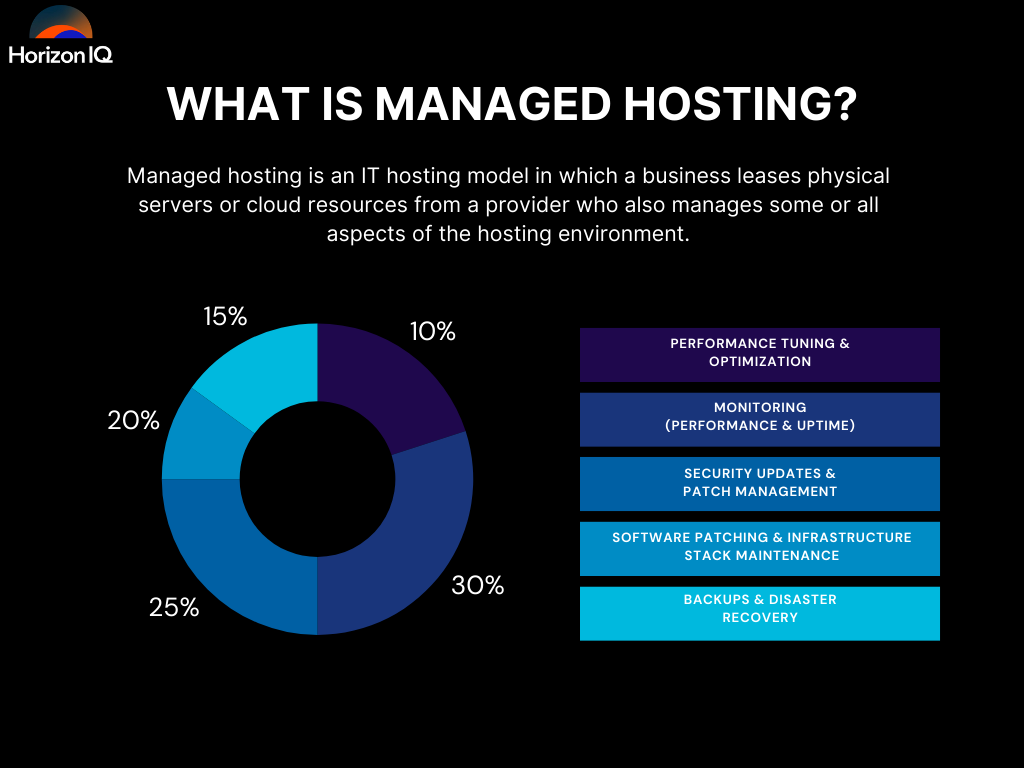
What is Managed Hosting?
Managed hosting is an IT hosting model in which the client leases servers or cloud computing resources from a service provider is responsible for overseeing the administration of the client environment or specific aspects of the client environment. Managed hosting services typically encompass server upkeep, resource monitoring, networking configuration, security updates, and operating system management.
Many managed hosting providers also offer managed backup and disaster recovery solutions, and extend management services beyond their own data centers to third party cloud providers like Amazon Web Services or Microsoft Azure.

Who Uses Managed Hosting?
Managed hosting is ideal for organizations that want to offload infrastructure management to experts, especially when internal resources are limited or better focused on core business activities. Typical users include:
- Small to Medium-Sized Businesses (SMBs): These organizations often lack in-house IT teams and prefer outsourcing server and security management to reduce complexity and overhead.
- SaaS Companies: Managed hosting supports scalability and compliance requirements without requiring internal infrastructure management.
- eCommerce Businesses: These companies rely on uptime, security, and fast response times—services typically bundled with managed hosting.
- Enterprises with Hybrid or Multi-Cloud Strategies: Some larger companies leverage managed hosting for specific applications or as part of a hybrid cloud deployment to reduce the management burden across environments.
Use cases include hosting critical applications, disaster recovery, supporting remote teams, meeting compliance needs (e.g., HIPAA, GDPR), and extending on-premise infrastructure into the cloud.
Managed vs Unmanaged Hosting
When choosing a hosting solution, it’s crucial to understand the difference between managed and unmanaged hosting. The distinction often boils down to who is responsible for maintaining the infrastructure—you or the provider.
Unmanaged hosting is a do-it-yourself model. The provider gives you access to infrastructure (like a bare server or virtual machine), and you’re responsible for setup, monitoring, updates, security, and troubleshooting.
Managed hosting, on the other hand, includes a support team that handles the technical heavy lifting—freeing you to focus on business outcomes instead of backend maintenance.
Here’s a side-by-side breakdown:
| Category | Managed Hosting | Unmanaged Hosting |
|---|---|---|
Infrastructure Setup |
Handled by provider | Handled by the customer |
Server Monitoring |
Included – proactive monitoring & alerts | Customer must configure and manage monitoring tools |
Security Management |
Includes firewalls, patching, antivirus, and vulnerability response | Customer is responsible for securing their environment |
Software Updates |
Provider maintains OS and software patches | Customer must manually install updates |
Backup & Disaster Recovery |
Often included or available as an add-on | Not included – must be set up by the customer |
Technical Support |
24/7 support from certified technicians | Limited or no support (basic infrastructure issues only) |
Control & Customization |
Less control; some providers restrict root access (co-managed options available) | Full control and root access to the system |
Skill Requirement |
Low to moderate – ideal for teams without deep DevOps or sysadmin expertise | High – requires strong technical knowledge and ongoing management |
Cost Structure |
Higher monthly cost, but lower in-house labor and downtime costs | Lower monthly cost, but higher total cost when accounting for time and expertise |
What Is the Evolution of Managed Hosting?
Before the proliferation of web hosting services, a business that wanted to be online had to first purchase their own server and networking infrastructure, as well the expertise necessary to maintain their websites. This proved both costly and challenging for most businesses, paving the way for hosting companies to lease server space for a fraction of the cost.
But there was still a skills gap. Traditional hosting services required customers to maintain their own systems, a challenge that gained prominence as services and system architecture grew more complex. Hosting companies quickly noticed the high demand for technical assistance from customers who lacked the capabilities to manage their own environments.
What Are the Top Benefits of Managed Hosting?
Economies of scale, network uptime, expertise and the ability to outsource repetitive tasks unrelated to one’s core business are among the most important benefits of managed hosting.
- Time Savings: With traditional, dedicated hosting, customers are required to manage their own networks, storage, servers and software upgrades. With managed hosting, much of the backend workload is taken care of so customers can focus on their applications and data.
- Cost Savings: Managed hosting plans trade capital expenditures for operational expenditures, meaning companies aren’t locked into expensive hardware refresh cycles and costs associated with maintaining on-premise data centers. Compared to unmanaged hosting services, managed hosting plans typically have a larger sticker price; however, the difference is often made up in reduced labor costs, which are typically the No. 1 expense of operating IT infrastructure.
- Technical Support: Available on-call around the clock, managed hosting providers employ technicians, system administrators and network operations engineers certified in a vast range of technologies. Hiring in-house for this degree of collective expertise is prohibitively expensive for all but the largest of enterprises.
- Reliability: Quality managed hosting providers operate fully redundant, Tier 3 data centers staffed by a 24/7 network operations center team, resulting in reliable service and high uptime.
Managed Hosting Differentiators: Solution Flexibility and SLAs
Two areas of managed hosting plans most often distinguish service providers: levels of control offered to customers and service level agreements (SLAs), which stipulate benchmarks around performance and service quality.
First, some fully managed hosting plans restrict customers’ access to their own environments. Meaning, the provider owns the entire management process. While ideal for customers who have no interest in maintaining any aspect of their infrastructure, many companies prefer to maintain control of certain processes, and thus need root access.
Co-Management plans allow customers to work as partners with the hosting provider to define areas of responsibility with granularity. Flexibility is also an important concern. Prospective customers should ask providers if they’ll be able to adapt the terms of the managed services at any point during the contract to accommodate changing needs.
Secondly, SLAs are doubly important for managed hosting services, as the value-add extends well-beyond network up time. Make sure your provider’s SLA accounts for support response time, issue resolution and access to senior-level management in the event of severe incidents. Furthermore, customers should expect full transparency and ensure the provider has a means of displaying up-to-date status of SLA performance.
Is Managed Hosting Secure?
Managed hosting providers know that the confidence in their service is derived from their ability to secure and handle their customer’s data and information with sensitivity. Most hosting companies employ enterprise grade firewall, antivirus and network security solutions, and also ensure that only authorized personnel can access sensitive materials.
Economies of scale is a factor here, as well. The cost of employing security personnel and technologies to protect environments is drastically lower per customer since the provider spreads these costs across their install base.
Customers can also access premium managed security services such as DDoS (distributed denial of service) identification and mitigation at the network level and OS hardening and patching at the server level.
Future of Software Defined Management for the Hybrid Cloud World
As more companies are choosing to move their infrastructure off-premise, the managed hosting industry is expected to grow for the foreseeable future. The biggest change, however, will be how providers manage environments.
Most companies are opting for hybrid or multi-cloud strategies, in which applications are hosted in multiple environments and different providers. As a result leading hosting providers like HorizonIQ are turning toward advanced automation and software defined processes for managing customer operating systems regardless of where they’re hosted.
By putting the workload and application first, companies can derive the benefits of flexible, hybrid hosting solutions while consolidating complex monitoring and management tools to one provider.



